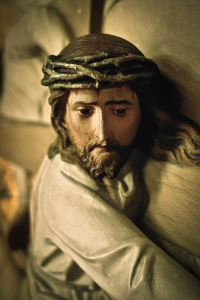 One of the greatest mysteries of our human existence and our Christian journeys is that of "suffering". Why does God allow it? What good is it? What causes it?
One of the greatest mysteries of our human existence and our Christian journeys is that of "suffering". Why does God allow it? What good is it? What causes it?
Most of us can understand that "suffering" came into the world at the Fall of Man.
Adam sinned, and therefore, lost the Sanctifying Grace that had been with him since the beginning of time. Because we are born (and must live) with the effects of that sin in the world, there is "suffering".
However, once we get past that basic understanding, things begin to get a little more complicated. We wonder why, if God loves us, He doesn't just eliminate suffering from the world. We question why, if He's a loving God, do innocent children have to suffer?
The answer, I believe lies in something that Evelyn Underhill (a great spiritual writer) shared about the Eucharistic "Secret" (as she calls it). The Eucharist is one sacrifice, and yet, it has two parts: the breaking of bread, and the drinking of the cup of Christ's Passion. Both halves, Ms. Underhill tells us, must come together if we are to experience a full life in our Christian journey.
Because our Father in heaven is infinitely good and merciful, He takes what was made "less than good" and restores it for His glory. Hence, only God can take a "bad" and from it, draw a "good".
If we trust and believe that God would never do, nor allow anything that wasn't best for us, then we can safely assume that "suffering" too, has its place in helping us grow closer to Him and become holy in His sight.
Jesus, Who came to live and die for us, and suffered much in order to bring about our Salvation, allows us to take our suffering (which, otherwise would be in vain) and unite it to His holy cross! Not only did He pour out His cup for us all, but, in His kindness and compassion, He allows us to drink from it ourselves!
In this way, our sufferings become blessings in disguise. In this way, we are united so closely to our loving Savior that we are able to take our place along-side Him and His Apostles at that first Eucharistic table.
Just as we, who are parents, will run to our injured child, scoop them up, and carry them to safety; and then nurture and tend to their wounds; so too, does God lift us up out of our suffering and gently cares for us so that we may heal.
Robert F. Morneau, in his "Daily Reflections for Lent", asks, "What cup of the Passion has the Lord given to you and your family"?
Let us consider this as we journey on in the Liturgical desert.
Let us see our suffering with new eyes.
Let us cling to the Cross and thank God for allowing us to take full part in "The Eucharistic Secret", for without the cup of His Passion, we have no Salvation.
Copyright 2011 Judy Dudich
About the Author

Guest
We welcome guest contributors who graciously volunteer their writing for our readers. Please support our guest writers by visiting their sites, purchasing their work, and leaving comments to thank them for sharing their gifts here on CatholicMom.com. To inquire about serving as a guest contributor, contact editor@CatholicMom.com.


.png?width=1806&height=731&name=CatholicMom_hcfm_logo1_pos_871c_2728c%20(002).png)
Comments